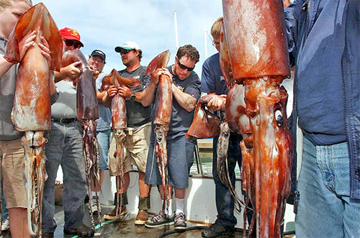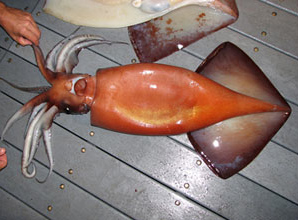Climate change may stop jumbo squid invasion
mongabay.com
December 15, 2008
|
|
Ocean acidification — driven by rising carbon dioxide levels in the atmosphere — may hurt the Humboldt squid, report researchers writing in the journal Proceedings of the National Academy of Sciences.
Humboldt squid, also known as jumbo squid, are found in the eastern Pacific and can measure 8-feet long (2.5 meters) and weigh up to 110 pounds (50 kg). The species has made news recently as it has expanded its range northward from the tropical Pacific. Humboldt squid are now frequently found off the California coast, with periodic “mass wash-ups” of squids on beaches. No one is sure what causes Humboldt squid to end up on beaches, but depletion of sharks and swordfish — the species’ main predators — is believed to the factor allowing them to expand their range.
 Photo credit: Dana Rene Bowler (Ventura County Star) |
The new research, conducted by Rui Rosa and Brad Seibel, suggests that Humboldt squid may not enjoy conditions favorable to their expansion for long. Rosa and Seibel found found that ocean acidification caused by changing oxygen and CO2 concentration will “substantially depress metabolic rates (31%) and activity levels (45%)” making it more difficult for the species to hunt in shallow waters — where conditions will be more acidic due to high CO2 levels — and avoid predation at depths exceeding 175 meters, due to reduced availability of oxygen.
 Kelly Benoit-Bird, Oregon State University |
“Squids will have to retreat to these shallower, less hospitable, waters at night to feed and repay any oxygen debt that accumulates during their [time at depth],” witre the authors. “The synergism between ocean acidification, global warming, and expanding hypoxia will compress the habitable depth range of the species. These interactions may ultimately define the long-term fate of this commercially and ecologically important predator.”
Rui Rosa and Brad A. Seibel. Synergistic effects of climate-related variables suggest future physiological impairment in a top oceanic predator. PNAS Online Early Edition the week of December 15-19, 2008